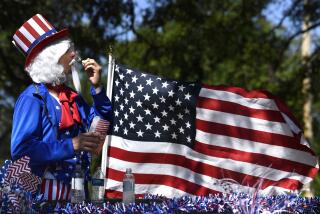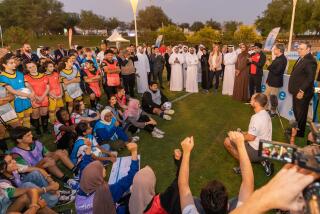Hot Dogs, Pepsi and Bud Mark 4th in Sarajevo as U.S. Opens Embassy
- Share via
SARAJEVO, Bosnia-Herzegovina — Diet Pepsi and Bud, grilled hot dogs and napkins emblazoned with the Statue of Liberty and the U.S. flag. A band playing “The Star-Spangled Banner.”
The United States brought a bit of itself to Sarajevo on Monday, celebrating Independence Day with the festive opening of an embassy.
Yet while American patriotism and idealism were on full display, fighting persisted in Bosnia and international mediators were gearing up for meetings that could determine whether there is peace or more war.
The opening of the U.S. Embassy, a three-story house newly coated with white paint and surrounded by a large neatly trimmed lawn, was a sign of U.S. support.
A cease-fire has largely held around Sarajevo since Serbs were forced to withdraw most of their heavy weapons in February or face North Atlantic Treaty Organization air strikes.
Bosnia’s government long has looked to the United States as its principal backer in its battle with Serbian rebels, and U.S. Ambassador Victor Jackovich reiterated Washington’s backing.
“We are thoroughly committed to assisting you to achieve the twin goals of peace and democracy, so you may get on with the important task of rebuilding your country,” Jackovich said.
In a city that only Sunday marked the second anniversary of a humanitarian airlift that kept it alive, about 700 military officials, doctors, cultural figures, politicians and prominent Sarajevans enjoyed a traditional Fourth of July picnic.
American idealism was on display. Jim Benazani, a volunteer firefighter from Fairfax County, Va., who gave up his summer holiday to help out in Sarajevo, was flipping burgers.
“I like doing this,” he said. “If I didn’t, I’d be home doing this with my family. But I’m here now showing the people of Bosnia a piece of the Fourth of July.”
Bosnia’s Muslim president, Alija Izetbegovic, found hope in the celebration.
“For us, it is a clear message of encouragement,” he said. “And for those who are on the other side of the barricade this is a warning that fascism has no future, and cannot succeed.”
But war still rages in Bosnia. Serbs still control about 70% of the republic and Izetbegovic’s government is still fighting to try to take pieces of it back.
Senior officials from the United States, Russia, and European powers met Monday in Geneva to put the finishing touches on a new proposal to give a Muslim-Croatian federation 51% of Bosnia and Serbs 49%.
The plan must be approved by a meeting today of foreign ministers, presented to the warring parties and then submitted to the Naples, Italy, summit of the top seven industrialized powers.
Serbs have complained that the division of territory is unfair. So did a senior Bosnian army commander at the picnic.
“If America stands behind that 51-49 division of Bosnia-Herzegovina, then it is not expressing democracy,” said Gen. Jovan Divjak, an ethnic Serb. “Bosnia-Herzegovina cannot be divided by percentages.”
More to Read
Sign up for Essential California
The most important California stories and recommendations in your inbox every morning.
You may occasionally receive promotional content from the Los Angeles Times.












